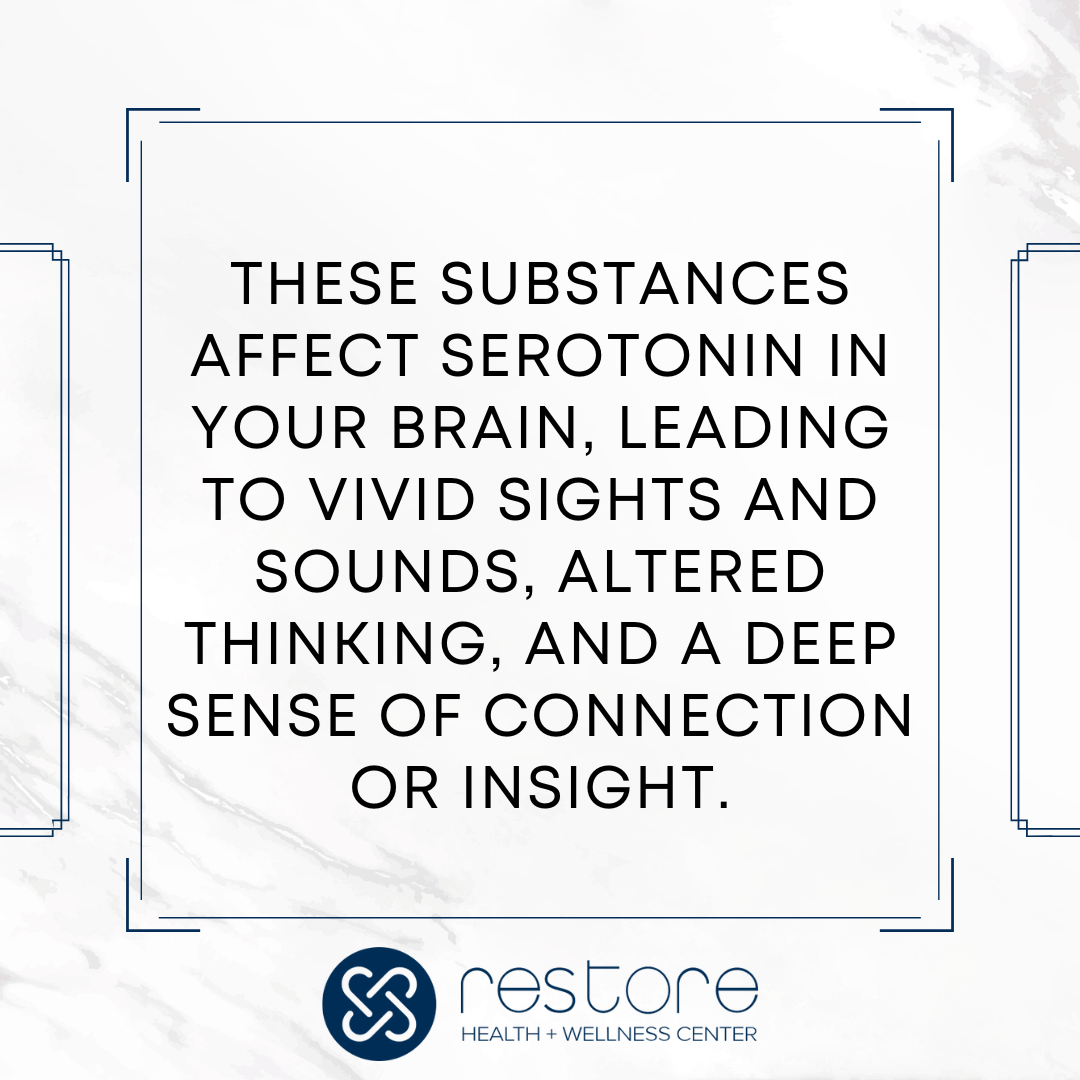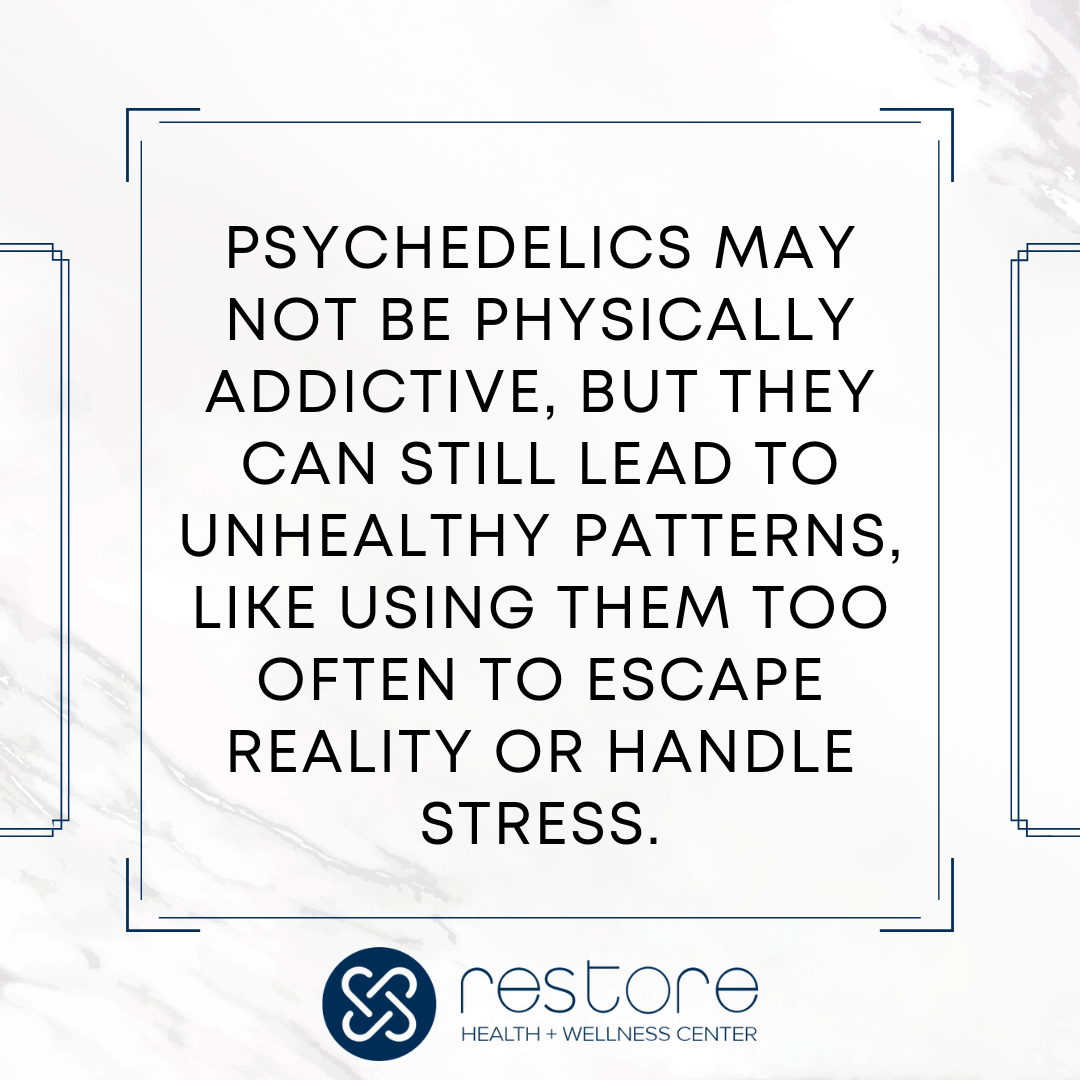
Have you ever wondered why more and more people are turning to psychedelics? Whether it’s in the context of mental health treatment or a weekend adventure, these mind-altering substances are gaining attention for their powerful effects.
Psychedelics, like LSD, psilocybin, and DMT, are known for changing the way you perceive the world around you. They can lead to vivid hallucinations, deep emotional experiences, and new ways of thinking. Their popularity is growing, especially as research uncovers their potential to treat conditions like depression, anxiety, and PTSD.
So, what exactly are psychedelics, and how do they differ from other substances? Let’s dive deeper into what they do to your brain and how they’re being used in different ways today.

What Are Psychedelics?
Psychedelics are a class of substances known for their profound effects on your perception, thoughts, and emotions. Common examples include LSD (lysergic acid diethylamide), psilocybin (found in magic mushrooms), and DMT (dimethyltryptamine).
These substances affect serotonin in your brain, leading to vivid sights and sounds, altered thinking, and a deep sense of connection or insight.
Recently, psychedelics have become popular not just for recreation but also for helping in therapy. Substances like psilocybin are showing promise in experimental research, where a single controlled dose has been found to help relieve symptoms of depression.
Psychedelics may also help treat anxiety, PTSD, and addiction. In a safe setting, they can help people process emotions and see things differently. People also use them for personal growth, spiritual experiences, or to enjoy their unique effects.
Now, psychedelics aren’t the only substances in this category of mind-altering drugs. There’s another related group called dissociatives, which includes drugs like ketamine and PCP. While psychedelics tend to enhance your sensory experience, dissociative drugs create a feeling of detachment from your surroundings, your body, or even your sense of self. Unlike the colorful, introspective journey psychedelics often provide, dissociatives can feel more like stepping out of your usual reality altogether.

Are Psychedelics Addictive?
You might wonder whether psychedelics like LSD or magic mushrooms can be addictive. While they don’t cause physical addiction like alcohol or nicotine, they can lead to psychological dependency in some people. This means someone might start depending on the feelings or experiences psychedelics give them, such as escape from reality or a sense of enlightenment.
For instance, a person might repeatedly use psychedelics to avoid facing personal challenges or to relive a powerful, mind-opening experience. Over time, this reliance can interfere with their ability to cope without the drug.
Several factors can increase the chances of dependency. Using psychedelics frequently is a big one, regular use can create a pattern that’s hard to break. The setting also plays a role, someone using psychedelics in unsafe or chaotic environments might develop unhealthy habits.
And if there are underlying mental health conditions like anxiety or depression, a person might turn to psychedelics as a way to self-soothe, which can lead to overuse.
Even though psychedelics aren’t traditionally addictive, it’s important to stay mindful of how and why they’re being used to avoid developing a problematic relationship with them.
Legal and Safety Concerns
Are psychedelics illegal? In many places, yes, they are. Substances like LSD, psilocybin, and DMT are classified as controlled drugs in most countries, meaning their use is heavily regulated or prohibited. Despite this, research is ongoing into their therapeutic benefits, and some areas are beginning to ease restrictions for medical or research purposes.
When it comes to safety, psychedelics are not without their risks. While they are not physically addictive, they can still have significant side effects. The effects on your mind can vary, but some common long-term side effects of psychedelics include confusion, intense emotions, flashbacks, and disturbing hallucinations.
For many people, the experience can be deeply insightful, but for others, it can lead to anxiety, panic attacks, or even “bad trips,” which can be scary or overwhelming.

What to Do If You or Someone You Know Struggles
Psychedelics may not be physically addictive, but they can still lead to unhealthy patterns, like using them too often to escape reality or handle stress.
The first step is to consider reaching out for professional help. Talking to a therapist or counselor who understands substance use can provide valuable guidance. If the situation feels more serious, addiction rehab programs are designed to help people regain control and build healthier habits.
Don’t underestimate the power of support, whether it’s from friends, family, or a support group. Having people to lean on can make a big difference in the journey to recovery.
If you’re unsure where to start, try searching “addiction rehab near me” to find resources in your area. Remember, taking the step to get help shows strength and commitment to a better future, whether it’s for yourself or someone you care about.

Conclusion
Psychedelics may not be physically addictive, but they can still lead to psychological dependency if used too frequently or in unsafe environments. Being aware of how often you use them, the setting, and your mental health is key. If you or someone you know is struggling with addiction, reaching out for help is an important step.
At Restore Center, we’re committed to working with you to find the most effective approach to your recovery. We’ll provide the support and guidance needed to ensure your treatment plan is realistic and successful. Take the first step toward a healthier future!




